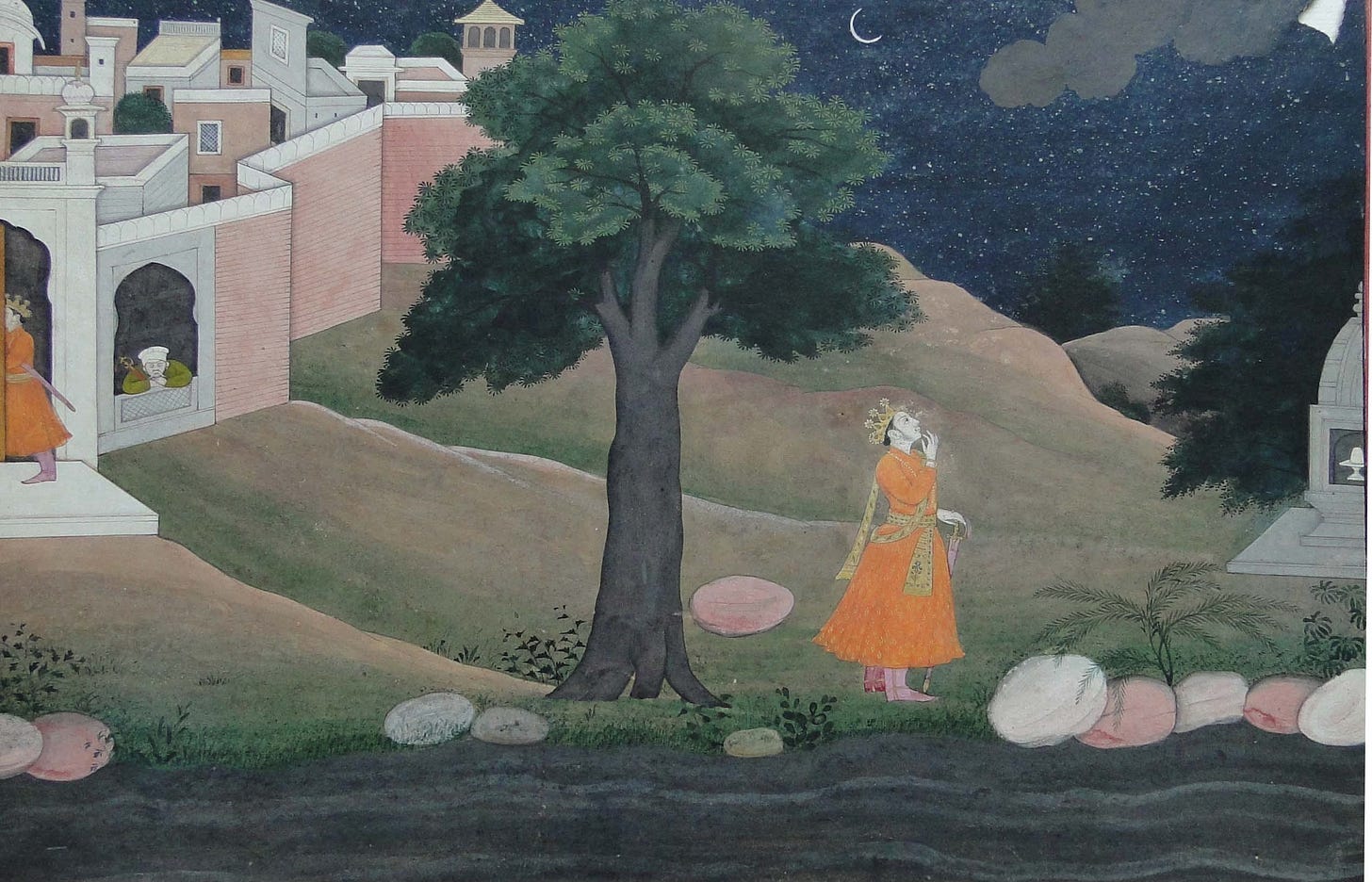📜Ek Mehfooz Manzil Kahaniyon Ki – Meghadūta by Kalidasa
There was a Yaksha. He became careless in his duties, so the Lord of the Yakshas cursed him to endure the heavy sorrow of separation from his wife for a year.
Crafted with care, just for you.
Storyline & Structure of Meghadūta
The Meghdoot is a lyrical poem divided into two parts: Poorvamegha (The First Cloud) and Uttaramegha (The Later Cloud). It revolves around a Yaksha (a nature spirit) who is separated from his beloved wife due to a curse from his master, Lord Kubera. Exiled to the distant place. Yaksha is overwhelmed with sorrow and longing for his wife.
In his desperation, the Yaksha sees a monsoon cloud passing by and pleads with it to be his messenger. He asks the cloud to deliver a message of love and longing to his wife, describing the journey the cloud must take. The poem is not just about the message but also about the vibrant, picturesque description of nature, landscapes, cities, and people, all seen through the poetic vision of Kalidasa.
Meghdoot is written in Mandakranta meter, a rhythmic and melodic meter that enhances the poem’s lyrical beauty. The poem consists of 120 stanzas, each capturing a different aspect of the journey and emotions.
Kalidasa’s genius shines through in the way he interweaves geography, emotions, and nature.
Meghadūta by Kalidasa
The translations provided are loose interpretations based on the original Sanskrit text of the verse. They aim to capture the essence and imagery of the poem while making it accessible in English and Hinglish.
For a more accurate understanding, it is recommended to refer to the original text and the references below.
Us mahine ki baat hai jab baarish se bhara duniya junoon se bhara hota hai,
Jo us naazuk, keemti jeevan ka intezaar karta hai, jo sapnon par aadharit hai.Usne aasha kiya ki baadal door tak uski khairiyat ka sandesh le jaaye,
Ab wo jhuk kar apne mehmaan ke liye ek shreshth arghya tayyar karta hai,
Aur naye khile kuttaj ke phool bikherta hai, jo khushi se khilte hain,
Aur khushi se baadal ka swagat karta hai, bolta hai, "Svāgata!"The month at hand when the rain-kissed world overflows with wild passion,
Driven by a desperate longing for that frail, precious life sustained by dreams.In hopes that the cloud might carry news of his well-being across distant lands,
He kneels to prepare a noble offering for his guest,
Scattering fresh summer blossoms that have suddenly bloomed with joy,
And joyfully welcoming the cloud, saying, "Welcome!"Interpretation:
In this verse, the Yaksha is deeply connected to the changing season, which mirrors his own emotional turmoil. The rain-kissed world symbolizes renewal and longing, resonating with his desire to reconnect with his beloved. His act of kneeling and preparing an offering reflects both reverence and hope, showing that he sees the cloud as a potential messenger of good news.
The fresh summer blossoms signify the joy of new beginnings and the vitality of life, even amidst sorrow. By welcoming the cloud with affection, the Yaksha expresses his deep yearning and hope for communication, highlighting the powerful connection between nature and human emotion. This moment encapsulates the beauty of longing and the hope that love brings, making it a poignant reminder of the heart’s desires.
Dhuaan, aag, paani aur hawa ka sangam, kya baadal hai?
Aur sandesh ka kaam kya in tej indriyon waale praniyon se karaya jaata hai?
Lekin apne utsukta ke karan in baaton ko anignore karte hue, us Yaksha ne usse vinti ki.
Kyuki jo prem mein vyakul hote hain, wo prani aur aprani dono se hi daya ki aasha karte hain.What is a cloud, but a convergence of smoke, fire, water, and wind?
Can messages really be conveyed by these skillful beings?
Yet, ignoring such thoughts due to his eagerness, the Yaksha pleaded with it,
For those who are tormented by love seek compassion from both sentient and insentient beings.Interpretation:
In this verse, the Yaksha contemplates the essence of a cloud and questions its ability to serve as a messenger. Despite these doubts, driven by his intense longing, he appeals to the cloud, reflecting on how lovers in distress often seek solace from all elements of nature.
References:
Kalidasa. Meghaduta: GRETIL Text Archive.
Kalidasa. Meghaduta: With Commentary by Mallinatha and Translation by M.R. Kale. Amazon, Link to Book.



